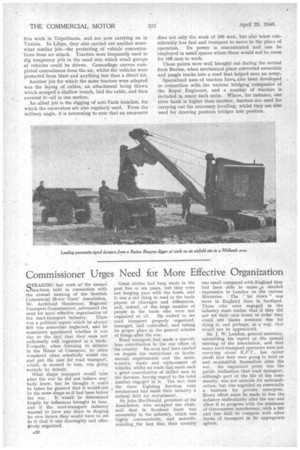Commissioner Urges Need for More Effective Organization
Page 28

If you've noticed an error in this article please click here to report it so we can fix it.
SPEAKING last week at 'the annual luncheon held in connection with the annual meeting of the Scottish Commercial Motor Users' Association, Mr. Archibald Henderson: Regional Transport Commissioner, advocated the need for more effective organization 'of the road-transport industry. There was a political aspect which he always felt was somewhat neglected, and he sometimes questioned whether it was due to the fact that they were not sufficiently well organized as a trade. Vormerly, when listening to debates in the House of Commons, he often ondered when somebody would rise and put the case for, road transport, which, a seemed to him, was going entirely by default.
What shape transport would take after the war he did not believe anybody knew, but he thought it could be taken for granted that it would not be the same shape as it had been before
the war. It would be determined largely by influences brought to bear, and if the road-transport industry wanted to have any share in shaping its own future they would have to see to it that it was thoroughly and effec:tively organized. Great strides had been made in the past five or six years., but they were not keeping pace with the times, and it was a sad thing to read in the trade papers of cleavages and differences, and, indeed, of the large number of people in the trade who were not
organized at all. He wished to see road transport properly organized, managed, and controlled, and taking its proper place in the general scheme of things after the war.
Road transport had made a marvellous contribution to the war effort of the country Its work lad been carried on despite the restrictions on fundamental requirements and the main-ttnance, repair and replacement of vehicles, whilst no trade had made such a great contribution of skilled men to the Services, having regard to the total number engaged in it. The fact that 0 the three lighting Services were mechanized had made their industry a natural field for recruitment.
. Sir John MacDonald, president of the Association, who occupied the chair, said that in Scotland there was unanimity in the industry, which was highly commendable, and notwithstanding the fact that their country was small compared with England they had been able to make a decided impression in London on the various Ministries. The "let down" was more in • England than in Scotland. Those who were engaged in the industry must realize that if they did not set their own house in order they could not blame someone else for doing it; and perhaps, in a way, that would not be appreciated. •
Mr. J. W. Loudon, general secretary, submitting his 'report at the annual meeting of the Association, said that many road-transport operators were not worrying about E.P.T., but rather aboflt how they were going to hold on and .re-establish themselves after the war. An important point was the public realization that road transport, . although part of the life of the corn, munity, was not suitable for nationalization, but was regarded as essentially a business for private enterprise. Every effort must be made to free the industry imittediately after the war and allow it to progress with the minimum of Government interference, with a lair and free field to compete with other forms of transport in its appropriate sphere.




















































